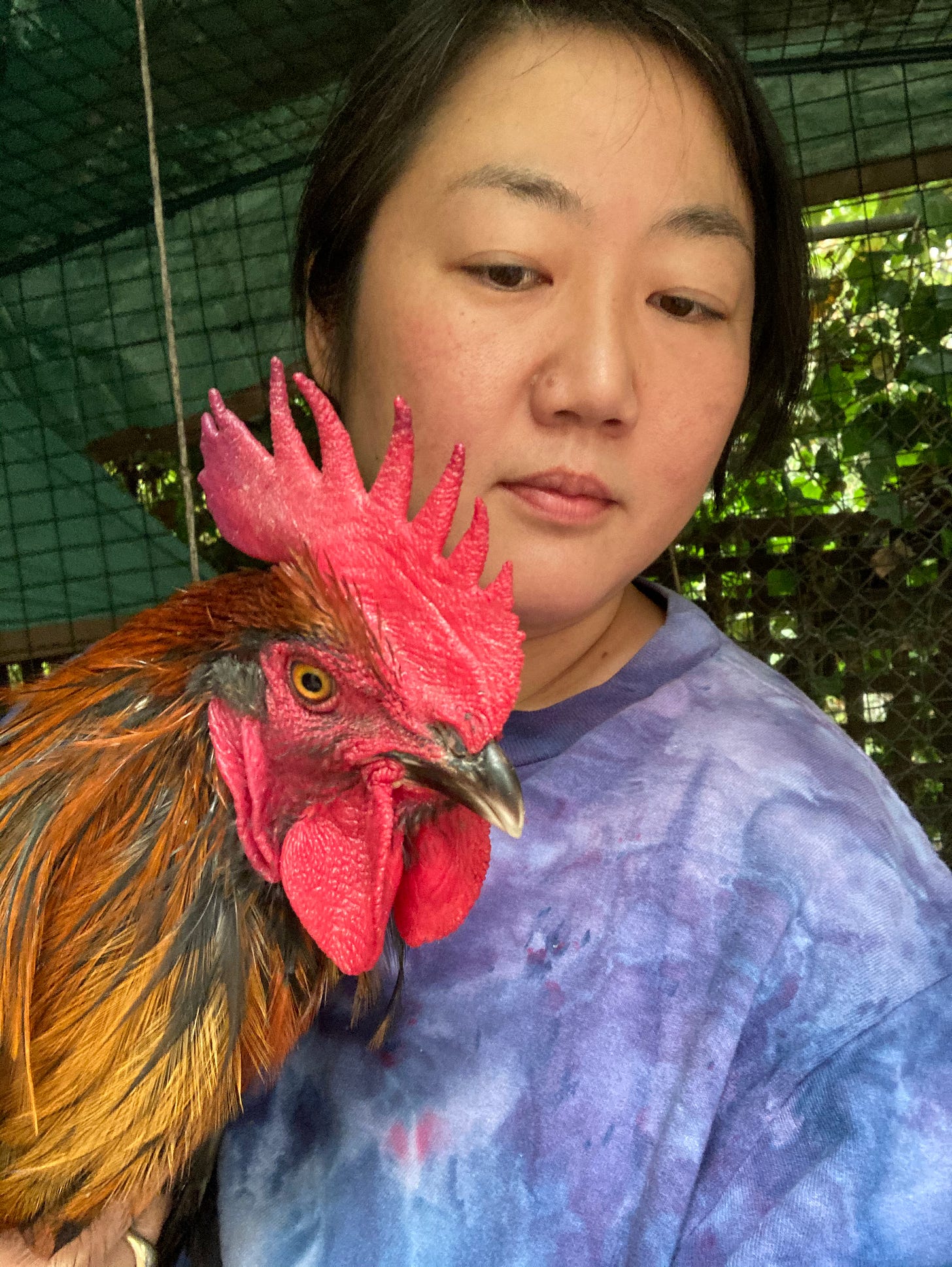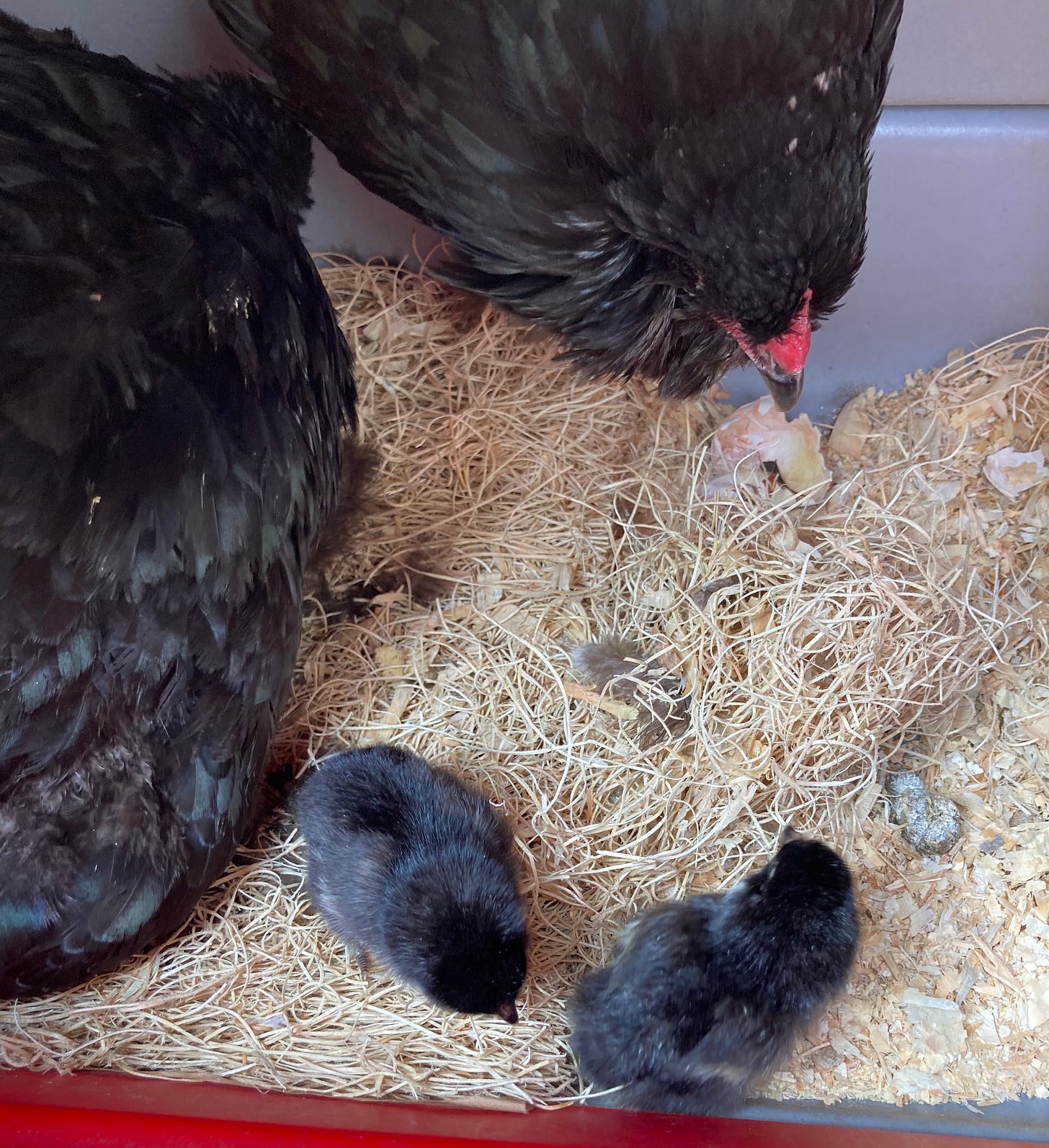I have had enough of worrying, caregiving, and death. My mom and dad are dead. My brother—well, he isn’t doing well, either. I’m avoiding codependence, but what does that leave you with? A mild slick of guilt, like fingers after eating fried chicken.
I wanted to lighten my load of worry. This past winter, I took inventory of things I fret over that don’t seem to take my advice or even try to survive. The things that, as my partner describes it, “eat the seed corn, not only because they’re hungry but because they don’t want to work or invest in planting.”
I worry about chickens a lot. I’ve had chickens since 2014, and I’ve been worrying about them nonstop for over ten years. They invite worry. They are not bred for intelligence; they were bred to lay eggs and be consumed, not for bravery, cleverness, or anything that would up its survivor rating, as they rate humans in Naked and Afraid. They don’t even fly very well; they remind me of people driving a car for the first time. Fits and starts. Erratic speed. Questionable navigation.
Every morning, I go out and check on them to make sure they’re all alive. I lock them up at night, but even then, one might die in the middle of the night. And I have to be very gentle because one time I startled a chicken, and it died right there and then. Sometimes, they go broody, and they will sit on eggs until they ail from malnutrition, refusing to eat or drink, determined to hatch eggs that aren’t fertilized and thus will never hatch. It is important to catch the broodiness early and not let the chicken really settle into that mindset, thus checking on them every day. Etcetera etcetera.
When avian flu spikes, I can’t let them free range for fear they’ll get avian flu. When word about a coyote or fox in the neighborhood pops up, I must keep them penned. When they free range, I have to keep one ear cocked for sounds of a disturbance to make sure they are all right. I only let them free range daily without worry when I had Brad the Meanest Rooster to protect them. To his credit, not a single hen died under his watch.
Brad died early last year. Throughout the avian flu outbreak, I’ve kept them penned to extend their lifespans.
But. I was overwhelmed with worry. And chickens were one worry too many. So, I decided to let my chicken flock wane.
This is the longest-lived flock I’ve ever had; this flock came to me at the beginning of the pandemic.
A predator broke into the locked coop just two weeks before the March 2020 lockdown, leaving feathers and carcasses. Not a single chicken remained alive. I’d never before lost an entire flock in one fell swoop. And I was stunned. I was so stunned that I decided I needed time before getting another flock.
But then the pandemic began. People hoarded toilet paper. Grocery stores sported empty shelves. I told myself this was the WORST time to lose a chicken flock; a reliable source of fresh eggs might have been nice.
All the hatcheries sold out of chicks. They were all sold out until September. (It was March).
I put out a call. My friend Yolanda said she had a connection.
A week later, I met Jorge the Onion Farmer at the curb outside her store in Oakland. He drove up in a truck and took out a cardboard box of straight-run chicks. He was a hobbyist chicken breeder, and the box contained both French Black Copper Marans, known best for their VERY dark brown eggs, and Black Ameraucanas that lay blue eggs. He picked out nine chicks, some of which would be roosters and some hens.
I remember being grateful for community at the time. I also chuckled because it felt illicit, even though it was not.
In the next year, the hens’ eggs were fertilized. And I successfully hatched eggs. One of them was a hen that laid olive-colored eggs, a mix of Brad the Mean-ass Rooster’s French Black Copper Maran genetics and a Black Ameraucana.
This flock’s story is deeply connected to these friendships, mutual aid, and the miraculous hatching of offspring eggs.
Letting this flock wane was, therefore, not an easy decision.
I let them free-range daily, thinking I would let them have the best of days. They figured out how to jump the fence and wandered into my front yard and sometimes onto the sidewalk. My neighbors called out of worry about the chickens in my front yard. I told them not to worry and shared my intentions with them.
I heard them flapping back over the fence each evening and returning to the coop to roost. I can attest to their joy and increased well-being from this newfound freedom because they gave me evidence. The Black Ameraucana hens in this flock stopped laying about two years ago. Suddenly, I found blue eggs from the Ameraucanas for the first time in a long time—not every day, of course, but once every two weeks or so.
Was it better to live a longer life confined to a coop and run? Or to live a shorter one without bounds?
My front yard became messy. The chickens overturned all the wood chips and scattered them onto the path and stairs. They ripped up half the plants.
But here’s the thing: I began to stop worrying. I’d let them go. They were having a good life.
A few months later, the predation began. One evening, a few chickens disappeared. They just didn’t come back home to roost. I found feathers in a different part of a yard as if they were raptured.
Things were fine again. But they did begin to disappear. Each time, as if raptured. And then finally, two remained.
And then there was one.
I heard her as usual in the morning. She was the most vocal hen. But her cooing sounded more plaintive, and so I peeked out. It was just her alone. She was a little lost for her bravery and resilience, the rest of her flock picked off one by one, until she became the sole survivor.
She tends to follow me wherever I go, this one hen that followed me when the others would not. And with her new status as a lone chicken, she was more dogged than ever in tracking my whereabouts, which is to say that she followed me into the main garden, where I looked for the other chicken.
I found the dark feathers not too far away.
Oh dear.
Chickens do not do well alone. I spent extra time in the garden with her and let her into the foodscape part of my garden. It is not a part of my garden I usually allow the chickens to go because they can wreak havoc on plants. But this one chicken? She deserved to have the best brunch and dinner party of her life.
This last chicken died in the night last weekend.
She didn’t come home to roost on Saturday night. I went to close the coop in the evening, and she was not there. I felt a little tenderness towards her, this last chicken.
I worried about her.
I wondered if she’d gone to roost somewhere else, perhaps up in a tree. Maybe she’d been spooked. After all, she’d done it once before; she was gone for a full forty-eight hours and then one afternoon, there she was again, scratching the dirt with the rest of the hens, which back then numbered six.
So maybe that was what happened.
On Sunday morning, she was still not there. There was no plaintive clucking, either.
But later in the day, I stepped out the front door and saw feathers as if a ring bearer had tossed them out of a basket to line the path before me. White and pale auburn. Just feathers, as if raptured, even if roughly.
Sometimes, I see a grisly piece of evidence. With all the other chickens, there was simply a trail of feathers after their rapture. But with this one chicken, I saw her head, and just the head, lying on the ground about twenty feet away.
She was dead.
And I—I was free from worry at great cost.







Oh I'm sorry for the loss, though I'm glad it will bring you more peace. I'm struck by your portrayal of how living safely and securely can make you miserable and living fully can perhaps cut your life shorter, but at least be worth it.
Thank you for taking us through this experience. I understand. Having 50, yes fifty, ducks at one point and then having to move house, I considered many options. I was lucky to have friends help find homes for all of them. Except the one that stayed behind and his for a week before the last handover. She’s still with me. And I took back 2 others. So we have 3. In a fortified ‘greenhouse ‘ with fencing but no solid roof or sides. And years on now I keep considering just letting them out.
I admire you for giving them the years and both protection and freedom.